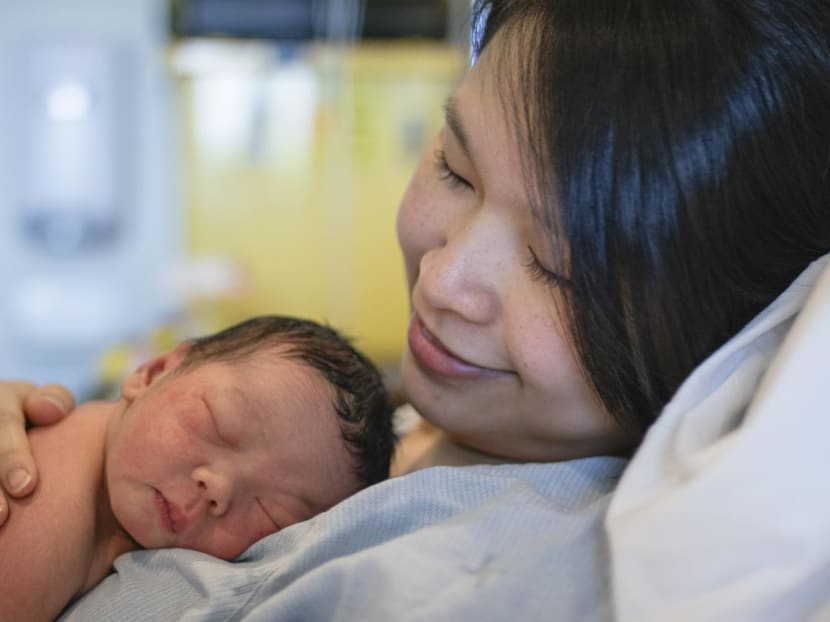‘You still look pregnant’, ‘She doesn’t look like you’: What not to say to a new (and vulnerable) mother
Do we unconsciously judge or criticise new mothers and their babies? During a time of great stress and transition, some of our seemingly harmless comments may cut deeper than we think.

“You still look pregnant.” “He’s so tiny.“ She doesn’t look like you.” Such comments may seem harmless but they’re not what any new mother wants to hear. (Photo: iStock/FatCamera)
Some months back, a friend of mine gave birth to a baby girl. Now, my friend is an attractive woman, but as she puts it herself, her baby did not conform to conventional standards of beauty. Her newborn had very small eyes and a large nose.
So when relatives and friends came to visit, it quickly became awkward.
The thing is, as a society, we have a rather peculiar way of welcoming new babies. Visitors surrounded the infant as if she were an exhibit in a museum. After appraising her, each felt compelled to offer some praise or comment.
Many of them politely said she was cute. But many of them quickly followed this with “She doesn’t look like you at all”, “She didn’t get your eyes”, “She looks like a boy”.
Then, they turned to my friend commenting on how tired she looked. One even exclaimed that she still looked pregnant.
When the guests left, my friend broke down in tears. If she was more vulnerable than usual, you could hardly blame her.
She was, after all, still recovering from her caesarean section, adapting to her new role as a mother, learning to breastfeed, coping with a three-hour sleep-feed schedule, fighting fatigue, dealing with drastic hormonal changes and struggling to reclaim her body and sense of self. These insensitive comments were enough to tip her over the edge.

She is not alone. Many new mothers have shared how insensitive comments or unsolicited advice caught them unawares and affected them more than they expected.
Which really begs the question: As a society, shouldn’t we be more sensitive towards new mothers at one of the most stressful points in their lives? Perhaps it is time to rethink some of these habitual comments which undermine new mums at a time when they really need our support.
RATING THE BABY’S CUTENESS
Let me just start by saying that if you have never been a parent and are not sure how to react to an infant, I totally get you. I used to be like that.
Newborns are fragile and rather uncommunicative. Since they have spent a long time scrunched up in the womb, and endured a stressful passage through a narrow birth canal, many also come out looking quite weird, and nothing like the cuddly, chubby babies on our social media feeds.
Many of them develop pimples all over their face as a result of maternal hormones circulating in their system after birth. Cradle cap is another common skin condition, where the baby’s head and eyebrows are covered with crusty and scaly patches. So it’s not your fault if you don’t find your friend’s baby adorable.
Indeed, some baby girls look like boys, and vice versa. Some look like they have inherited the wrong set of features from each parent. Many of them cry a lot because they are hungry, tired and just not used to being out of the womb. They need time to grow into their own skin and into their own person.

So when visiting a new mum, don’t expect to always be blown away by cuteness, and be mindful to filter your thoughts.
If you have a sincere compliment about how adorable the baby is, by all means, share that with the parent. Otherwise, don’t feel like you have to chime in with a critique. Even an innocuous comment like “she is tiny” may trigger anxiety in a mother who had a premmie or is struggling to breastfeed.
If you are not sure what to say, fall back on the most basic exchange you would have with any new person. Start with “Hi, nice to meet you. I can’t wait to get to know you.”
Remember that parents and babies are still easing into their new role, so give them the space to find themselves on unprejudiced grounds.
CRITIQUING THE MOTHER’S APPEARANCE
Speaking of societal standards and judgement, much has been said about how mothers tend to be measured against a very unrealistic yardstick. Indeed, motherhood is one of the most romanticised experiences anywhere in the world. Whether on TV or social media, the stock image is that of a beautiful woman tenderly holding a sleeping infant.
So let’s address this elephant in the room. Real life is a lot less pretty.
Imagine putting on 15kg to 20 kg over 10 months. Your belly swells, your feet swell and your body is flushed with hormones. Truly, there is no other time a person’s body changes quite so fast or drastically unless they are gravely ill.
All this doesn’t reverse the moment the baby pops out. Most women, even Catherine, Princess of Wales, come out of the delivery room looking a few months pregnant. Many women will carry this extra weight for weeks or months. Some will never lose it entirely.

And this is not the only change rippling through a new mum’s world. If she’s gone through a natural birth, her pelvic muscles and tissue may have stretched so much that she may suffer from urinary incontinence for a year or even longer.
If she has had a caesarean section, she will carry that scar for life. And if she is breastfeeding, chances are, her nipples are cracked, bleeding and excruciatingly sore.
The point is, bringing a new life into the world is as tumultuous as it is miraculous.
During this challenging time, is it really necessary to state the obvious about a mother’s weight or eye bags? Wouldn’t it be more meaningful to simply cook her a nutritious meal or help her with chores and errands so she can get adequate rest and reclaim her body?
OFFERING UNSOLICITED ADVICE OR CLICHES
Another strange thing that happens when someone has a baby is that suddenly, everyone has an opinion about how you should raise the baby.
Should you breastfeed or use formula? Should you let the baby cry it out or pick him up immediately? Are you dressing your baby too warmly or not covering her up enough?
This sort of sharing was probably more necessary in our parents’ time as a way of passing down practical tips and wisdom. But today, when there are 20 self-help books on each topic and every question is a Google search away, it simply adds stress to an already stressful situation.

After all, each woman works with vastly different circumstances. Some may lack support while some have a large extended family to lean on. Some have fewer resources than others, and some go through multiple miscarriages before conceiving, have difficult births or have infants who start their lives in the ICU.
All these shape their views, choices and parenting style, and no one has a monopoly on what a good mother should do, so why impose your beliefs on others?
In some cases, even neutral advice can add stress. In my own motherhood journey, two of the motherhood cliches I found most unhelpful were “Sleep when the baby sleeps” and “Enjoy every minute of it, they grow up so fast”.
Granted, both carry a nugget of truth. But it wasn’t until I actually had a baby that I realised just how difficult they were to put into action.
Personally, I struggled to get any meaningful rest in the two-hour interval that my baby was sleeping because I had to pump, sterilise the pumping equipment, bathe, eat, do basic chores, shop for necessary items, and then quieten my mind before trying to fall asleep. And given how exhausted I was, being told to enjoy every minute of it simply made me feel both guilty and misunderstood.
What new mothers need is practical support and empathy, not unsolicited advice and snap judgements.
Many mothers I know describe motherhood as an exhausting, lonely and isolating experience. So how we welcome the new mother and baby will make a huge difference in how well new mothers cope with this huge transition.
CNA Women is a section on CNA Lifestyle that seeks to inform, empower and inspire the modern woman. If you have women-related news, issues and ideas to share with us, email CNAWomen [at] mediacorp.com.sg (CNAWomen[at]mediacorp[dot]com[dot]sg).












